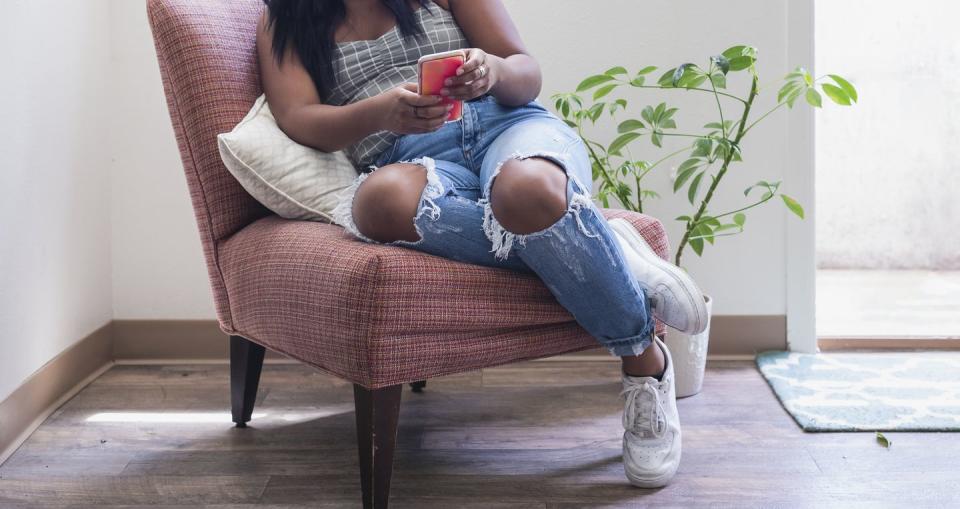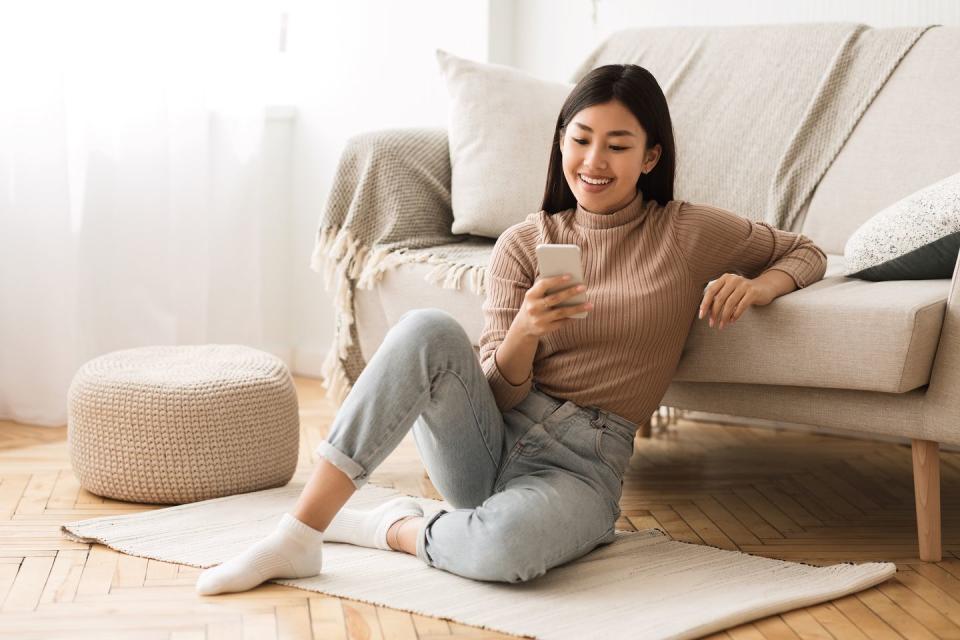11 apps to try if you're struggling with low mood or depression

When it comes to treating a common mental illness like depression, there are a whole host of tools that can help – from medication (reminder: there's no shame in taking medicine to help with your mental health), to therapy. Many cite exercise (such as running or yoga), focussing on good nutrition, reaching out to friends and family, and practising acts of self-care as beneficial too. Often, it's about finding the combination that works best for you.
But as the world continues to evolve on the technology front, doctors are increasingly suggesting an array of apps that could be helpful for treating low mood too (especially in areas where there's a long wait time for therapy). Of course, it's still well worth making an appointment to discuss your mental health if you feel something isn't quite right, or reaching out to a charity, such as Mind, for more information on getting support. If you need somebody to talk to, the Samaritans are available 24/7.
In the meantime, here are eleven different apps that come recommended by somebody who has experienced a form of depression themselves, or by the NHS:
1) Headspace
"I use it all the time, for every aspect of my mental health. At points, when my relationship was really bad, Headspace was one of the things that kept me going, along with kung fu. It's also great for sleeping too! As well as offering guided meditations, I like how it tracks your progress and you can build up a 'run streak' – which is the number of days you meditate for in a row. When I started, I just used the 10 day intro for about 6 months but after seeing the benefits, decided to pay for access to all the elements available. There are brilliant three-minute rescue meditations for when you feel like you're really about to lose your shit." – Ed
Headspace is available on iOS and Android. Free with in-app purchases from £4.17.

2) ReWi
"I love that ReWi, which was created with Yale University, offers a simple way of creating and tracking goals – for things like meditation, gratitude, savouring, kindness, connection, exercise and sleep, as well as general life goals. Not only does it encourage you to create a goal, but to think about how you'll feel once you have completed it and why that's important too. The app also has a space to note down your mood each day, which is a great way of tracking when you're feeling down and spotting any patterns. There's a Yale University course that goes with the app, so I don't feel like I'm doing it alone, and online modules available each week, should you want to access them. The fact that the app and course are free is a real bonus." – Mona
ReWi is available on iOS and Android. Free.
3) Stoic
"I started using Stoic after a friend recommended it. It offers a series of exercises, and I like the prompts and that there are sections to complete for both morning and evening – it takes the pressure off of me just opening the app and staring at it. I would say it could do with a clearer guide on how to use the app to get the most out of it at the beginning, as when you download it there are a tonne of settings and sections, so it can get a bit overwhelming. Once you get to grips with it though, it's well worthwhile. I also really like the breathing element of the app, it takes you through a routine and as it counts you in and out, the phone thumps like a heartbeat. It’s also visual, with shapes that get bigger and smaller as you breathe." – Megan
Available on iOS and Android. Free with in-app purchases from £5.99.
4) Silver Cloud
Making an appearance on the NHS' list of approved mental health apps, Silver Cloud sees users work through a series of topics picked out by a therapist to address specific needs. The course, which uses Cognitive Behavioural Therapy (CBT) techniques, lasts for eight weeks and is designed to be completed at a pace that works best for you. Note: you will need a GP referral to be able to use this app.
Available on iOS and Android. Free, but does require a GP referral to log in.
5) Gratitude Happiness Journal
"During my lower periods, this app (which acts as a journal in which you can jot down things that you appreciate in life) has helped me to look back at my past entries and to remember things that make life feel better." – Priya*
Available on iOS and Android. Free with in-app purchases from £4.99.

6) Woebot
"I was lucky to be able to speak to an excellent GP in Wimbledon, London. I had to self-refer for CBT and counselling for anxiety and depression, so he told me about an app I could use while I waited. Woebot is a robot that chats to you about your day and can offer some simple, non-tailored coping strategies. It was an interesting distraction and did offer some useful tips, but it didn't compare to the deep dive one-to-one counselling gave me." – Isabella
Available on iOS and Android. Free.
7) Better Help
"A doctor recommended Better Help to me – it’s essentially a 24/7 counselling service. You pay £140 a month for it (I was at such a low point in my life that I wasn’t going out, or buying things, so I could afford it) and are assigned a counsellor from around the world, who you can literally message whenever you want. They will also message you to check in and see how you’re doing. The thing I found hardest about counselling and therapy in-person was for the hour I was there, it was great, but the second I left I was alone with my thoughts again. With Better Help, someone was always there for me. I was also put on medication for depression, without seeing a doctor (it was over the phone), so I felt like I was another tick box, rather than being truly understood. I found having someone who was consistently there for me, was a lot more helpful than simply swallowing the tablet. I'm now in a much better place and have met an incredible group of friends through attending Barry's Bootcamp classes, which also boost my mood." – Rachel
Available on iOS and Android. £140 per month.
8) Breathwrk
"This app has helped me to focus on the present moment. I've really found that having an emphasis on my breathing takes me away from my thoughts. It helps with my anxiety, as well as low mood (often the two come hand in hand)." – Meliz
Available on iOS. Free with in-app purchases from £1.99.
9) Moodpath: Depression and Anxiety
"I was encouraged to use this app by my CBT therapist. It was a really useful way for me to take some accountability for recognising and reporting my symptoms. It gave me a sense of empowerment and enabled me to explore and learn what my triggers are, as well as how to manage and avoid them." – Ellie
Available on iOS and Android. Free with in-app purchases from £3.99.
10) Calm
"Calm is great! It has a wide selection of uses from meditation to stories that are specifically designed to help you get to sleep. There's a price tag (I pay £28.99 for a year), but it's worth it for all the times it's helped me through anxiety ridden nights and I rely on it to go back to, even if I've heard the stories lots of times. They also have famous voices involved that add to the ambience and comfort. It's a really nice touch." – Joe
Available on iOS and Android. Free with in-app purchases from £13.49.
11) Feeling Good: Positive Mindset
Another app recommended by the NHS, Feeling Good offers four free audio tracks (which blend soothing music with gentle coaching, to help with stress, anxiety and depression) to get started. The main offering is a 12-track Positive Mental Training audio programme, available to purchase. The NHS in Edinburgh have used the programme for the past 12 years.
Available on iOS and Android. Free with in-app purchases from £2.99.
*Name has been changed
Like this article? Sign up to our newsletter to get more articles like this delivered straight to your inbox.
You Might Also Like

 Yahoo News
Yahoo News 